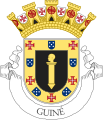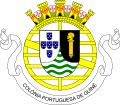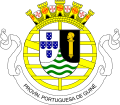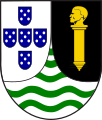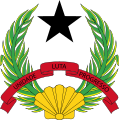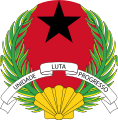Emblem of Guinea-Bissau facts for kids
The national emblem of Guinea-Bissau is like a special picture that represents the country. It was chosen very soon after Guinea-Bissau became independent from Portugal in 1973.
Quick facts for kids Emblem of Guinea-Bissau |
|
|---|---|
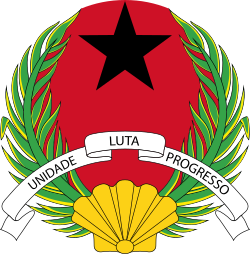 |
|
| Armiger | Republic of Guinea-Bissau |
| Adopted | 1994 |
| Crest | None |
| Torse | None |
| Blazon | Gules, in chief a Mullet or five points Sable |
| Supporters | Two wreathes of laurel proper |
| Compartment | A sea shell Or |
| Motto | Unidade, Luta, Progresso (Portuguese: "Unity, Struggle, Progress") |
| Order(s) | None |
What Does the Emblem of Guinea-Bissau Mean?
The emblem of Guinea-Bissau has several important symbols. A big black star is right in the middle. This star is a well-known symbol for Pan-Africanism. Pan-Africanism is a movement that encourages unity among all African people. This star is often called the Black star of Africa.
At the bottom of the emblem, you can see a seashell. This seashell reminds us that Guinea-Bissau is located on the west coast of Africa, right by the ocean. Two olive branches surround the seashell. Olive branches are a common symbol for peace.
There is also a red banner at the bottom. On this banner, you will find the country's motto. The motto is written in Portuguese: "Unidade, Luta, Progresso". In English, this means "Unity, Struggle, Progress".
How the Emblem Changed Over Time
Before Guinea-Bissau became independent, it was a colony of Portugal. Because of this, it had different emblems over the years. In 1935, Portugal gave official emblems to all its colonies. These emblems followed a similar design.
See also
 In Spanish: Escudo de Guinea-Bisáu para niños
In Spanish: Escudo de Guinea-Bisáu para niños
 | Misty Copeland |
 | Raven Wilkinson |
 | Debra Austin |
 | Aesha Ash |


